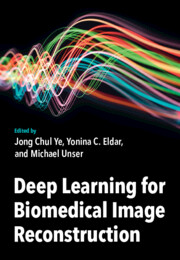Book contents
- Frontmatter
- Dedication
- Contents
- List of Contributors
- Preface
- Part I Theory of Deep Learning for Image Reconstruction
- Part II Deep-Learning Architecture for Various Imaging Architectures
- Part III Generative Models for Biomedical Imaging
- 12 Image Synthesis in Multi-Contrast MRI with Generative Adversarial Networks
- 13 Regularizing Deep-Neural-Network Paradigm for the Reconstruction of Dynamic Magnetic Resonance Images
- 14 Regularizing Neural Network for Phase Unwrapping
13 - Regularizing Deep-Neural-Network Paradigm for the Reconstruction of Dynamic Magnetic Resonance Images
from Part III - Generative Models for Biomedical Imaging
Published online by Cambridge University Press: 15 September 2023
- Frontmatter
- Dedication
- Contents
- List of Contributors
- Preface
- Part I Theory of Deep Learning for Image Reconstruction
- Part II Deep-Learning Architecture for Various Imaging Architectures
- Part III Generative Models for Biomedical Imaging
- 12 Image Synthesis in Multi-Contrast MRI with Generative Adversarial Networks
- 13 Regularizing Deep-Neural-Network Paradigm for the Reconstruction of Dynamic Magnetic Resonance Images
- 14 Regularizing Neural Network for Phase Unwrapping
Summary
In this chapter, we provide an overview of a recent image-reconstruction method that uses a deep generative algorithm for dynamic magnetic resonance-imaging (dMRI). We begin by briefly introducing the imaging modality of dMRI, the associated image-reconstruction problem, and existing reconstruction approaches. Next, we introduce the time-dependent deep image prior (TD-DIP), which exploits the structure of convolutional neural networks (CNNs) as a regularizing prior. We show some representative results and discuss the pros and cons of this regularizing paradigm. Finally, we discuss a few potential remaining limitations.
Information
- Type
- Chapter
- Information
- Deep Learning for Biomedical Image Reconstruction , pp. 299 - 311Publisher: Cambridge University PressPrint publication year: 2023
